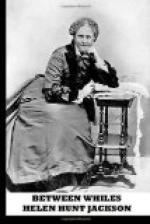The pigeons were not burned, after all. Most savory did they smell, and Willan Blaycke and his friend fell to with a will.
“Saidst thou not thou hadst some of thy famous pear cider left, landlord?” asked Willan.
“Ay, sir, my granddaughter has gone to draw it; she will be here in a trice.”
As he spoke the door opened, and Victorine entered, bearing in her left hand a tray with two curious old blue tankards on it; in her right hand a gray stone jug with blue bands at its neck. Both the jug and the tankards had come over from Normandy years ago. Victorine raised her eyes, and looking first at Willan, then at his friend, went immediately to the older man, and courtesying gracefully, set her tray down on the table by his side, and filled the two tankards. The cider was like champagne; it foamed and sparkled. The old man eyed it keenly.
“This looks like the cidre mousseux I drank at Littry,” he said, and taking up his tankard tossed it off at a draught. “Tastes like it, too, by Jove!” he said. “Old man, out of what fruits in this bleak country dost thou conjure such a drink?”
Victor smiled. Praise of the cider of the Golden Pear went to his heart of hearts. “Monsieur has been in Calvados,” he said. “It is kind of him then to praise this poor drink of mine, which would be but scorned there. There is not a warm enough sunshine to ripen our pears here to their best, and the variety is not the same; but such as they are, I have an orchard of twenty trees, and it is by reason of them that the inn has its name.”
Willan was not listening to this conversation. He held his fork, with a bit of untasted pigeon on it, uplifted in one hand; with the other he drummed nervously on the table. His eyes were riveted on Victorine, who stood behind the old man’s chair, her soft black eyes glancing quietly from one thing to another on the table to see if all were right. Willan’s gaze did not escape the keen eyes of Victorine’s grandfather. Chuckling inwardly, he assumed an expression of great anxiety, and coming closer to Willan’s chair said in a deprecating tone,—
“Are not the pigeons done to your liking, sir? You do not eat.”
Willan started, dropped his fork, then hastily took it up again.
“Yes, yes,” he said, “that they are; done to a turn.” And he fell to eating again. But do what he would, he could not keep his eyes off the face of the girl. If she moved, his gaze followed her about the room, as straight as a steel follows on after a magnet; and when she stood still, he cast furtive glances that way each minute. In very truth, he might well be forgiven for so doing. Not often does it fall to the lot of men to see a more bewitching face than the face of Victorine Dubois. Many a woman might be found fairer and of a nobler cast of feature; but in the countenance of Victorine Dubois was an unaccountable charm wellnigh independent of feature, of complexion,




